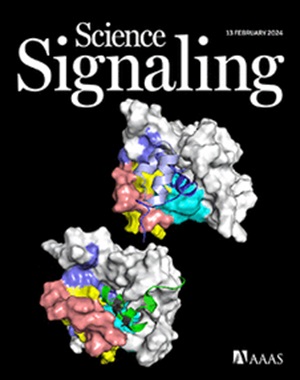肿瘤来源的小细胞外囊泡重编程感觉神经以驱动肿瘤微环境中的免疫抑制
IF 6.6
1区 生物学
Q1 BIOCHEMISTRY & MOLECULAR BIOLOGY
引用次数: 0
摘要
神经免疫串扰正在成为中枢神经系统以外肿瘤生长和进展的重要调节因子。在本期的《科学信号》中,Restaino等人证明,肿瘤来源的细胞外小泡通过改变浸润的感觉神经元的分泌特征来促进肿瘤生长,产生一个前馈回路,最终驱动肿瘤微环境中的免疫抑制。本文章由计算机程序翻译,如有差异,请以英文原文为准。
Tumor-derived small extracellular vesicles reprogram sensory nerves to drive immunosuppression in the tumor microenvironment
Neuroimmune cross-talk is emerging as an important regulator of tumor growth and progression in cancers beyond the central nervous system. In this issue of Science Signaling, Restaino et al. demonstrate that tumor-derived small extracellular vesicles promote tumor growth by altering the secretory profile of infiltrating sensory neurons, generating a feed-forward loop that ultimately drives immunosuppression in the tumor microenvironment.
求助全文
通过发布文献求助,成功后即可免费获取论文全文。
去求助
来源期刊

Science Signaling
BIOCHEMISTRY & MOLECULAR BIOLOGY-CELL BIOLOGY
CiteScore
9.50
自引率
0.00%
发文量
148
审稿时长
3-8 weeks
期刊介绍:
"Science Signaling" is a reputable, peer-reviewed journal dedicated to the exploration of cell communication mechanisms, offering a comprehensive view of the intricate processes that govern cellular regulation. This journal, published weekly online by the American Association for the Advancement of Science (AAAS), is a go-to resource for the latest research in cell signaling and its various facets.
The journal's scope encompasses a broad range of topics, including the study of signaling networks, synthetic biology, systems biology, and the application of these findings in drug discovery. It also delves into the computational and modeling aspects of regulatory pathways, providing insights into how cells communicate and respond to their environment.
In addition to publishing full-length articles that report on groundbreaking research, "Science Signaling" also features reviews that synthesize current knowledge in the field, focus articles that highlight specific areas of interest, and editor-written highlights that draw attention to particularly significant studies. This mix of content ensures that the journal serves as a valuable resource for both researchers and professionals looking to stay abreast of the latest advancements in cell communication science.
 求助内容:
求助内容: 应助结果提醒方式:
应助结果提醒方式:


